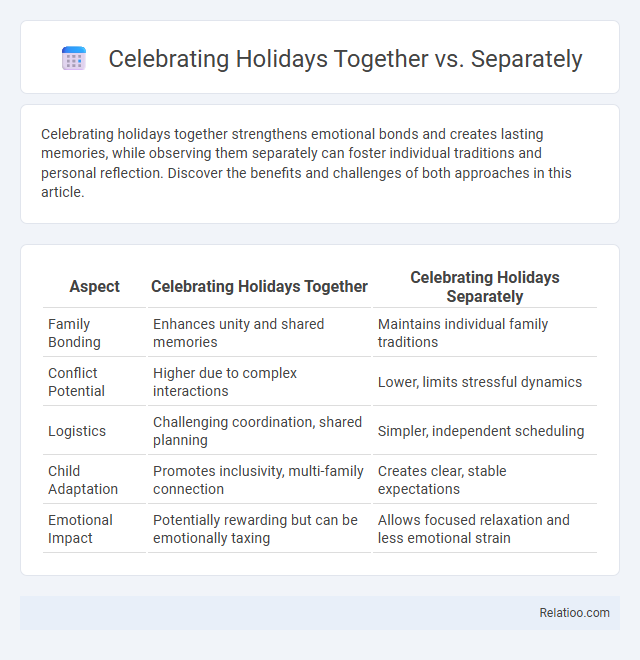Celebrating holidays together strengthens emotional bonds and creates lasting memories, while observing them separately can foster individual traditions and personal reflection. Discover the benefits and challenges of both approaches in this article.
Table of Comparison
| Aspect | Celebrating Holidays Together | Celebrating Holidays Separately |
|---|---|---|
| Family Bonding | Enhances unity and shared memories | Maintains individual family traditions |
| Conflict Potential | Higher due to complex interactions | Lower, limits stressful dynamics |
| Logistics | Challenging coordination, shared planning | Simpler, independent scheduling |
| Child Adaptation | Promotes inclusivity, multi-family connection | Creates clear, stable expectations |
| Emotional Impact | Potentially rewarding but can be emotionally taxing | Allows focused relaxation and less emotional strain |
Introduction: Navigating Holiday Traditions
Navigating holiday traditions involves balancing the joy of celebrating together with the personal fulfillment found in separate gatherings. Family traditions play a crucial role in shaping these celebrations, providing a sense of continuity and belonging across generations. Understanding individual preferences and shared values helps create meaningful holiday experiences that honor both unity and individuality.
The Emotional Impact of Shared Celebrations
Shared celebrations foster deep emotional bonds by creating lasting memories and reinforcing a sense of belonging within your family. Family traditions during holidays provide comfort and continuity, strengthening relationships through familiar rituals. Celebrating separately may lead to emotional distance, but shared experiences enrich your connection and collective happiness.
Pros and Cons of Celebrating Together
Celebrating holidays together fosters strong family bonds, creating cherished memories and a sense of unity that supports emotional well-being; however, it can also lead to heightened stress due to differing expectations and potential conflicts. Your collective traditions and shared experiences enhance feelings of belonging but may require compromise that limits individual preferences and personal space. The pros of togetherness often outweigh the cons if open communication and mutual respect are maintained during holiday gatherings.
Benefits of Celebrating Holidays Separately
Celebrating holidays separately allows family members to honor their unique traditions and personal preferences, fostering individual expression and reducing potential conflicts. It encourages deeper appreciation for diverse cultural practices and can strengthen relationships by offering space for meaningful, personalized celebrations. This approach also provides opportunities for quieter, more reflective holiday experiences that suit introverted or busy family members.
Family Dynamics: Managing Expectations
Navigating family dynamics when celebrating holidays together versus separately requires clear communication to manage diverse expectations effectively. Recognizing each family member's preferences and traditions fosters mutual respect and reduces conflicts during festive gatherings. Balancing shared holiday experiences with individual family traditions supports emotional well-being and strengthens relational bonds.
Cultural and Religious Considerations
Celebrating holidays together fosters family unity by honoring shared cultural and religious traditions, enhancing a sense of belonging and continuity. Observing holidays separately allows individuals to respect diverse beliefs and personal preferences, promoting inclusivity within blended families or multicultural environments. Your approach to holiday celebrations can balance these factors by acknowledging specific rituals while embracing varied cultural and spiritual expressions.
Communication Strategies for Holiday Planning
Effective communication strategies for holiday planning include setting clear expectations and actively listening to family members' preferences to balance celebrating holidays together or separately. Establishing open dialogue through family meetings or group chats helps coordinate schedules and respects individual traditions, enhancing mutual understanding. Prioritizing flexibility and empathy in conversations supports maintaining cherished family traditions while accommodating diverse holiday plans.
Tips for Blending Traditions
Blending holiday traditions can enrich your family's celebrations by incorporating diverse customs that reflect everyone's background. Start by openly discussing each person's cherished traditions and selecting elements that resonate with the whole family, ensuring inclusivity and respect. Your thoughtful approach to combining rituals creates meaningful memories and strengthens familial bonds during the holiday season.
Creating Memorable Experiences, Together or Apart
Creating memorable holiday experiences hinges on the choice between celebrating together or separately, each offering unique opportunities for connection and personal growth. Family traditions serve as a foundation for shared memories and cultural continuity, whether gathered in one place or connected across distances through virtual celebrations and coordinated activities. Prioritizing meaningful interactions and intentional moments, regardless of physical presence, ensures lasting bonds and cherished holiday memories.
Conclusion: Finding the Right Holiday Balance
Finding the right holiday balance involves respecting your family traditions while embracing new ways to celebrate that suit your current life circumstances. You can create meaningful memories by blending time-honored customs with separate celebrations that honor individual preferences and schedules. Prioritizing open communication and flexibility helps ensure that holiday gatherings remain joyful and inclusive, fostering stronger family bonds.

Infographic: Celebrating Holidays Together vs Separately
 relatioo.com
relatioo.com